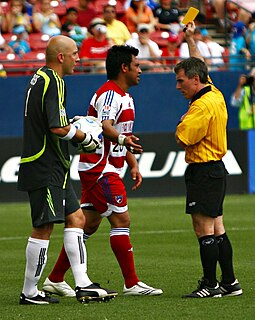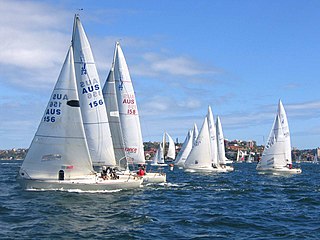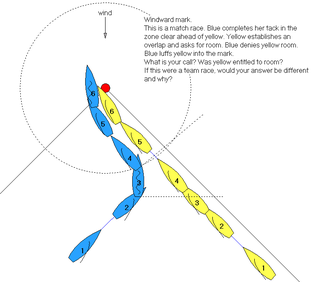
A referee or simply ref is the person of authority in a variety of sports who is responsible for presiding over the game from a neutral point of view and making on-the-fly decisions that enforce the rules of the sport, including sportsmanship decisions such as ejection. The official tasked with this job may be known, in addition to referee, by a variety of other titles as well, including umpire, judge, arbiter, arbitrator, linesman, commissaire, timekeeper, touch judge or Technical Official.

Dinghy racing is a competitive sport using dinghies, which are small boats which may be rowboats, have an outboard motor, or be sailing dinghies. Dinghy racing has affected aspects of the modern sailing dinghy, including hull design, sail materials and sailplan, and techniques such as planing and trapezing.

The International Laser Class sailboat, also called Laser Standard and the Laser One is a popular one-design class of small sailing dinghy. According to the Laser Class Rules the boat may be sailed by either one or two people, though it is rarely sailed by two. The design, by Bruce Kirby, emphasizes simplicity and performance. The dinghy is manufactured by independent companies in different parts of the world, including LaserPerformance, Performance Sailcraft Australia (Oceania) and Performance Sailcraft Japan.

World Sailing (WS) is the world governing body for the sport of sailing recognized by the International Olympic Committee and the International Paralympic Committee (IPC).
Sailing/Yachting is an Olympic sport starting from the Games of the 1st Olympiad. With the exception of the 1904 and the canceled 1916 Summer Olympics, sailing has always been included on the Olympic schedule. The Sailing program of 1908 was open for a total of five sailing classes (disciplines), but actually only four Sailing events were contested. The planned venue of all races, named matches, was Ryde, Isle of Wight.

The International 420 Class Dinghy is a double-handed monohull planing dinghy with centreboard, bermuda rig and center sheeting. The name describes the overall length of the boat in centimeters. The hull is fiberglass with internal buoyancy tanks. The 420 is equipped with spinnaker and optional trapeze. It has a large sail-area-to-weight ratio, and is designed to plane easily. It can be rigged to be sailed single-handed.
The Olympic triangle is a sailing course used in racing dinghies, particularly at major regattas like State, National and World Titles and was used at the Olympics.
Performance Handicap Racing Fleet (PHRF) is a handicapping system used for yacht racing in North America. It allows dissimilar classes of sailboats to be raced against each other. The aim is to cancel out the inherent advantages and disadvantages of each class of boats, so that results reflect crew skill rather than equipment superiority.
The International 14 is a 14-foot double-handed racing dinghy. The class originated in England in the early part of the 20th century. It is sailed and raced in many countries around the world and was one of the very first true international racing dinghy classes recognised by International Sailing Federation. It is a Development Class being controlled by a set of rules that allow for innovation and changes in hull and rig design as long as they fall within a set of specific limitations such as length, weight, beam, and sail area. The class has permitted its rules to be revised at various times in its history in order to keep the class at the forefront of dinghy racing development and can now best be described as an ultralight dual-trapeze sailing dinghy with large sail area. It is often raced with boats of similar design in one-design, or non-handicap races.

The Farr 40 is a 40-foot one-design sailboat designed by Farr Yacht Design in 1996 following after the Mumm 30. It is currently built by US Watercraft. It was originally designed under the International Measurement System (IMS) rule, but quickly became popular and developed its own one-design class.

Wild Oats XI is a maxi yacht, most famous for being the former race record holder and a nine-times line honours winner of the Sydney to Hobart Yacht Race. Launched in 2005, she was owned by Bob Oatley and skippered by New South Wales Mark Richards, who founded Palm Beach Yachts Australia.

Sailing as a sport involves a variety of competitive sailing formats that are sanctioned through various sailing federations and yacht clubs. Racing disciplines include matches within a fleet of sailing craft, between a pair thereof or among teams. Additionally, there are specialized competitions that include setting speed records. Racing formats include both closed courses and point-to-point contests; they may be in sheltered waters, coast-wise or on the open ocean. Most competitions are held within defined classes or ratings that either entail one type of sailing craft to ensure a contest primarily of skill or rating the sailing craft to create classifications or handicaps.
The Offshore Racing Congress (ORC) is an international body for the sport of competitive sailing and is responsible for the establishment and maintenance of rating and classification standards used to define offshore, that is marine as opposed to inland, yacht racing handicap categories.
The International One Metre (IOM) is a class of Radio Sailing Boat used for racing under the International Sailing Federation Racing Rules of Sailing. It is a measurement-controlled box rule originally created by the ISAF-RSD in 1988 in an attempt to harmonise the various one metre rules created around the world. The IOM Class Rules specify a standardised sail plan and control of the other major performance dimensions while allowing some freedom in hull design. The IOM is now the largest and arguably most competitive of all radio sailing classes.

The Transpac 52 (TP52) is a class of yacht used for competitive yacht racing. The class is recognised by the International Sailing Federation which entitles the class to hold an Official World Championships.
Race Officers are a type of race official used during the running of sailing races run under the Racing Rules of Sailing. Their role is primarily linked to on-the-water race management issues. Primarily they are responsible for laying the course and starting and finishing the races. The International Sailing Federation helps train its member national authorities, many of whom have a national race officers program. The most experienced become International Race Officials recognised by the International Sailing Federation.
The Turkish Sailing Federation (TYF) is the national governing body for the sport of sailing in Turkey, recognised by the International Sailing Federation.
The Korea Sailing Federation is the national governing body for the sport of sailing in South Korea, recognised by the International Sailing Federation.









